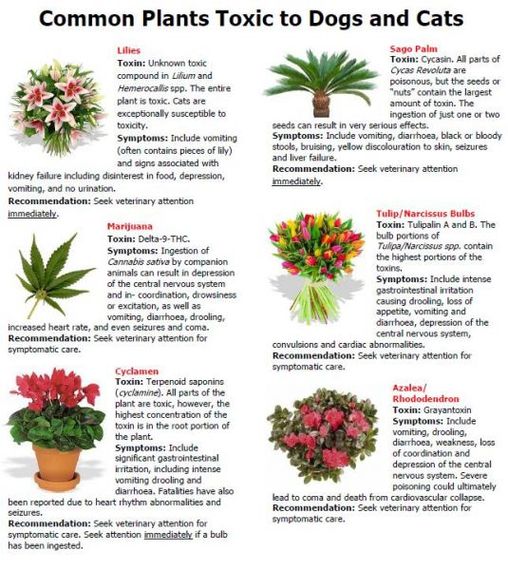Spring is here and summer is just around the corner. This is the time of year we all love! We can take our pets out, romp around, play in the now lush green grass and just enjoy the great outdoors. We can enjoy eating all the fresh summer bounty of fruits and vegetables Mother Earth has sprouted forth.
Or can we?
Please keep this in mind for your pet's safety and wellbeing:
These are the ten most toxic human foods and should never be given to your pets.
- Caffeine
- Chocolate
- Avacado
- Pitted Fruits
- Grapes
- Raisins
- Tomatoes
- Cherries
- Spicy Foods
- Macadamia Nuts
- Chewing Gum
- Mushrooms (If you can't have them, neither can your pets)
- Onions
- Garlic
- Chicken, turkey or fish bones
Here is a list of healthy human foods your pets can have:
- Apples (no seeds)
- Blueberries
- Strawberries
- Green Beans
- Carrots
- Seedless Watermelon
- Bananas
- Sweet Potatoes
- Squash
Ok, let's talk about inside your home.
These are just some of the plants that are dangerous to your pets and should be avoided. Think about what is in your yard! Are many of these plants adorning your walkways, driveways or just planted for curb appeal?
How do you control weeds and insects in your yard?
Healthy Pets reports:
Pesticides and Canine Malignant Lymphoma
Most dogs love a carpet of thick green grass. They run around on it, roll on it, dig at it, and stick their noses in it. But unlike humans, who launder their clothes and bathe regularly, dogs don't change their fur or footpads every day. Whatever collects on their feet and coat outdoors stays there until the next time they get a bath. It also gets deposited across multiple surfaces inside your home, including carpeting, rugs, furniture and pet bedding.
A recently published study conducted over a six-year period by the Cummings School of Veterinary Medicine at Tufts University showed that exposure to lawn pesticides, specifically those applied by professional lawn care companies, raised the risk of canine malignant lymphoma -- a progressive, fatal disease -- by as much as 70 percent.
You may not be aware of it, but most flea and tick preventives are actually pesticides, regardless of what form they come in -- spot-on treatments, pills, dips, solutions, shampoos, or collars.
Spot-on products attracted the attention of the EPA in 2009 after reports surfaced of over 40,000 adverse events the prior year, including 600 deaths of family pets. The agency called for new labeling requirements, but as recently as September, four cats were reported to have died from misuse of the products.
It's important to remember that just because a compound is applied to or worn on your pet's fur doesn't mean it's safe. What goes ON your pet goes IN your pet, by absorption through the skin or ingestion during grooming
Protecting Your Pet from Toxic Pesticides
Don't apply pesticides to your yard, and if you use a lawn care service, don't allow them to use chemicals, either. The same goes for herbicides, and be aware that a neighbor's herbicide can potentially contaminate your property and pose a risk to your pet.
Avoid lawn care and other gardening products that contain insect growth regulators (IGRs). (And be aware that the chemical pyriproxyfen, an IGR, is used in certain flea/tick spot-on treatments.)
Don't allow your dog access to any lawn unless you can confirm no pesticides have been used.
Please remember that your home, kitchen and yard all contain extremely dangerous and toxic items in them.
Plan ahead, think about the fertilizer, weed and pest control sprays and powders you are planning on using outside and research the first. Do the same for the flea and tick medications you plan to use.
Research their effects on your animals and find non-toxic yet effective alternatives.
The ASPCA Guide to Pet Safe Gardening has lots of information on their site to help.
Please print out the Pet Poison Helpline infomation and keep it handy - maybe with a magnet on the fridge.
Have a happy and healthy summer - you and your pets! They are family, too!!
As always, make sure your pet has easy access to plenty of fresh water during the summer hours and plenty of accessable shade. Do not leave your dog alone, tied or chained outside. Always remember that the heat and humidity is rough on them as well and they don't all get to go jump in a pool or hop in a nice cool shower at the end of a hot, steamy day.
I always kept a kid's pool, a round, shallow one in our yard for our water loving dogs. They loved it and could pop in whenever they wanted to cool down. They are easy to clean and we also used it to bathe them in! Dump out the dirty water, give it a rinse, refill and you and your dog are good to go.
Finally, never, under any circumstances, leave any pet in your car unattended. You may think rolling the windows down a couple of inches might help but studies show, it doesn't and they can die quickly.
According to the ASPCA:
When it's 80 degrees outside, your car will be a staggering 114 degrees in less than 30 minutes.
Worse still, dog can't cool themselves down as easily as people, and once they overheat, they can suffer extensive organ damage or die.
Please be mindul of those wonderful and loving "children" you have and just make sure they're safe and that you have planned ahead. If you aren't sure about something, click one of the links in this article and they can surely help you. Thank you so much for reading this and I hope you find it helpful, even as just a reminder.
Happy summer, everyone!!!


